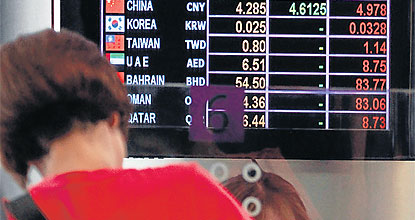
The SET index on Wednesday dived 1.57% as lingering concerns that the government may impose measures to cool the rapid pace of the strengthening baht clouded sentiment.

A woman exchanges money at a booth in Bangkok yesterday. The baht traded at 29.06/29.14 to the US dollar at 6pm in Bangkok yesterday. THANARAK KHOONTON
The benchmark index extended its losing streak to a third day, closing at 1,543.67 points in trade worth 83.7 billion baht. It has fallen by 3.4% over the past three sessions.
Foreign investors yesterday were net sellers of 3.2 billion baht worth of Thai shares.
The baht becoming Asia's strongest currency is reminiscent of the local stock market's crash after the government imposed a 30% reserve requirement on capital inflows in October 2006.
The baht yesterday ended at 29.06/29.14 to the US dollar, its strongest level since being floated in July 1997.
Paul Gambles, the MBMG Group's managing partner and chief investment officer, said panic in the global economy could cause the domestic financial market to suffer a harsh correction some time in the next two years.

Gambles: Panic may bring correction
The government's continued consumption stimulus through measures such as rice pledging and special tax rebate schemes is a large part of the economic growth momentum that is prompting the increased inflows, which are feeding the cycle of rising local asset prices, he said.
"It is very likely that developments in the US, the EU or China over the next two years will cause a short-term correction on the SET, which could see it falling by 30-50% or shedding the value of the baht by 10-20% against the dollar, reversing it to 35 to the dollar," said Mr Gambles.
He said domestic assets have recorded relatively higher gains since the start of last year compared with other regional economies.
One indicator is last year's 20-30% increase in the SET index compared with the 10% rise of the MSCI.
"I don't think the situation in 2013 will repeat the events of 1995-96. The bubble now is much smaller and concentrated in less-liquid and smaller stocks. The price of large stocks haven't gone up as much," said Mr Gambles.
He said another difference from the 1997 economic crisis also lies in the fact that the external environment will be the main factor in the movement of local asset prices.
Adisak Phupiphathirungul, a strategist at Thanachart Securities, said calls from some brokerages for higher deposits on margin loans used to trade some stocks were also blamed for the sharp fall in bourses.
Downside risks remain as long as the possibility lingers that authorities may impose draconian measures, he said.
"Stock market fluctuation could continue in the short run, and only long-term investors are advised to pile up stocks at the moment. For short-term investors, 1,520 to 1,530 points is the recommended entry point," he said.
Despite the sell-offs, Thanachart is maintaining this year's SET index target at 1,650 to 1,700 points.